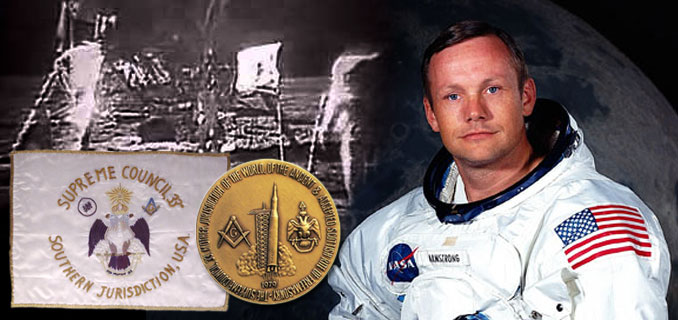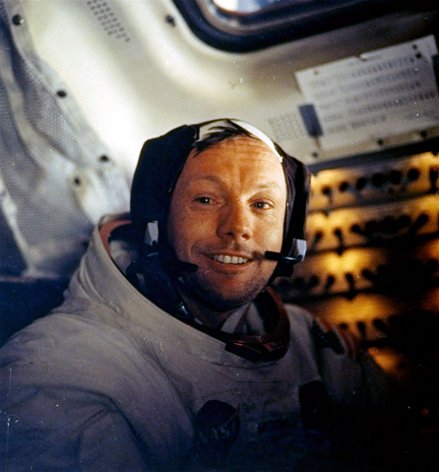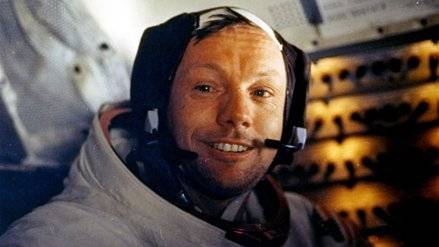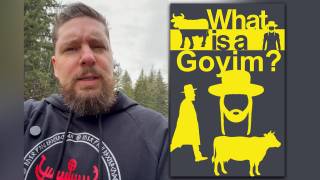Neil Armstrong, the moon’s mystery man, dies

Neil Armstrong, first man on the moon, dies aged 82
By Cass Jones| The Observer
 Neil Armstrong, the first man to walk on the moon, has died aged 82. The former US astronaut, who will go down on history as the most famous pioneer of space exploration, passed away as the result of heart complications following surgery.
Neil Armstrong, the first man to walk on the moon, has died aged 82. The former US astronaut, who will go down on history as the most famous pioneer of space exploration, passed away as the result of heart complications following surgery.As commander of the Apollo 11 mission, he became the first person to set foot on the moon, on 20 July 1969, fulfilling the longheld dream of the United States to get there before the Soviet Union. His first words as he stepped on to the surface – "That’s one small step for man, one giant leap for mankind" – instantly became one of the most recognisable phrases ever uttered.
Armstrong underwent heart bypass surgery earlier this month, just two days after his birthday on 5 August, to relieve blocked arteries.
His family released a statement on Saturday describing him as a "reluctant American hero who always believed he was just doing his job".
It read: "We are heartbroken to share the news that Neil Armstrong has passed away following complications resulting from cardiovascular procedures. Neil was our loving husband, father, grandfather, brother and friend. Neil Armstrong was also a reluctant American hero who always believed he was just doing his job. He served his nation proudly as a Navy fighter pilot, test pilot, and astronaut.
"While we mourn the loss of a very good man we also celebrate his remarkable life and hope that it serves as an example to young people around the world to work hard to make their dreams come true, to be willing to explore and push the limits, and to selflessly serve a cause greater than themselves."
Other tributes have come flooding in for the astronaut as news of his death spread across the world. US president Barack Obama hailed Armstrong as one of America’s greatest heroes. In a statement issued by the White House, he said the crew of Apollo 11 carried with them the aspirations of an entire nation when they set out for the moon in 1969. He later tweeted: "Neil Armstrong was a hero not just of his time, but of all time. Thank you, Neil, for showing us the power of one small step."
Former astronaut Tom Jones, who completed four space shuttle flights between 1990 and 2001, said: "Mr Armstrong was one of the astronauts that was my hero when I was growing up and I watched his initial landing on the moon in 1969 with incredible interest. He really was an inspiration to an entire generation of people." The US space agency tweeted: "Nasa offers its condolences on today’s passing of Neil Armstrong, former test pilot, astronaut & the 1st man on the moon. Neil was 82."
[...]
Read the full article at: guardian.co.uk
Neil Armstrong, the moon’s mystery man
By Virginia Heffernan | The Lookout
"A lot of people couldn’t figure out Armstrong."
With those words Tom Wolfe introduced Neil Armstrong, the astronaut hero of his nonfiction masterpiece, "The Right Stuff." Armstrong, of course, was a masterpiece himself: the commander of the 1969 Apollo 11 mission and the first man ever to walk on the moon. Armstrong died Saturday from complications relating to heart surgery. He was 82.
All these decades, Armstrong, the lunar Adam, has represented a code his admirers knew better than to try to crack. Not that, early on, great literary minds—besotted by the baby-faced genius—didn’t try.
Wolfe continued: "You’d ask him a question, and he would just stare at you with those pale-blue eyes of his, and you’d start to ask the question again, figuring he hadn’t understood, and— click —out of his mouth would come forth a sequence of long, quiet, perfectly formed, precisely thought-out sentences."
So Wolfe warned against understanding Armstrong in "The Right Stuff." And that warning was more or less heeded, somewhat miraculously, until Armstrong’s dying day. Profilers kept their mitts off him. Hollywood starlets didn’t swoop in to wreck his family. And, most mercifully of all, Carson and Merv Griffin and Dinah Shore and Ali G and Oprah didn’t demand that he couch-surf with them.
This is astounding. In the 1960s and ’70s , the national pastime was psychologizing postwar celebrities—John F. Kennedy, Marilyn Monroe, Muhammad Ali. And once a hero is cracked open by one Vanity Fair profile, the pile-on never ends. This one had a sex addiction; this one had a chip on her shoulder; this one could never live up to his big brother.
Let’s not do that to Armstrong, Wolfe pleaded. In any case, the great man simply would not succumb. Armstrong was simply, at heart, not homo psychologico. He was homo machinator, homo ingeniator. The engineering man.
In an era when everyone was expected to evince the adolescent emotionality of Marlon Brando or Allen Ginsberg, Armstrong was resolutely adult and elegantly square. He was a Navy pilot from a small town who married a home-ec major at Purdue whom he had no recollection of courting or even proposing to. (Janet Armstrong, with whom he had three children, evidently didn’t remember any courtship either.)
Though astronauts in the time were represented as hard-partying matinee idols, Armstrong always described himself as a "white-socks, pocket-protector, nerdy engineer." He wasn’t boasting, though engineers are, of course, the hotshots of today: the hackers and technologists who keep pushing into the new breach—the postfinal frontiers of cyberspace.
Once in 1969, Norman Mailer bullied Armstrong into saying something—anything—romantic about going to the moon. (Armstrong would have to cough up the romance, Mailer wrote, or be considered "a spiritual neuter.") Armstrong stood his ground like a Buddha. "I think we’re going to the moon because it’s in the nature of the human being to face challenges," he said, defying Mailer. "It’s by the nature of his deep inner soul ... We’re required to do these things just as salmon swim upstream."
Those words are perhaps the most gorgeous words the press-shy astronaut ever said, including his famous scripted line about the giant leap.
Michael Collins, an Apollo 11 crewmate, wrote that Armstrong "never transmits anything but the surface layer, and that only sparingly ... I like him, but I don’t know what to make of him, or how to get to know him better."
[...]
Read the full article at: news.yahoo.com
CPA Australia Presents
An Audience with Neil Armstrong
Neil Armstrong: 1930 - 2012
A message from Alex Malley, CEO, CPA Australia
"For an inspirational man who achieved so much in his life, it’s his humility that I will always remember when interviewing him last year. He was testament to what can be achieved through vision and dedication. His legacy will live on forever. My sincere sympathies go out to Neil’s family on this sad day."
For videos of Neil Armstrong’s entire interview, please go to CPAAustralia.com.au
Tune into Red Ice Radio:
Jay Weidner - Hour 1 - Kubrick’s Odyssey: How Stanley Faked the Moon Landings
Alan Watt - Moon Landing, UFO’s & Fake Alien Threat
Mike Bara - Dark Mission, The Occult NASA Moon Mission
Marcus Allen - Nexus Magazine, Technology in Ancient Egypt & The Moon Landing
Red Ice TV:
Episode 5 - The Secret Space Program






















